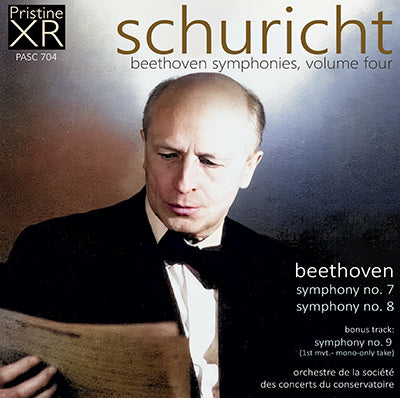
This album is included in the following sets:
This set contains the following albums:
- Producer's Note
- Full Track Listing
- Cover Art
“My immediate impression was that I had never heard Beethoven conducted in quite this way. That is not the same as saying I had never heard Beethoven played this way. By certain string quartets, for example. I was reminded of Serkin playing the piano sonatas, even more, perhaps, of late Backhaus. The first symphony immediately created an impression of gut conviction and great vitality. As with late Backhaus, technical perfection is not an essential, phrasing can be a bit rough and breathless, but you get a sense of contact with the music that you more often get from hands-on performers than from conductors whose vision has to be realised by others: namely the orchestra. This generally translates into brisk, spinning tempi that are not driven, or goaded onward, by a conductor with a whip, but have a vitality that seems to arise from the music. In the second movement of this same symphony there is a warm songfulness rather than an attempt to wrest a prayer for humanity from every phrase. It is here, too, that the French woodwind are at their most piquant.
I must record a curious sensation over this. While it is true that the Historically Informed brigade would run a mile from such vibrato, modern performances on period-style instruments have rediscovered a factor which was still available in Paris in the 1950s. Each instrument has its own personality, makes its own contribution to the argument, instead of being blended so that the wind band might as well be a harmonium. With the wind forwardly balanced into the bargain, these performances contain elements that were scarcely heard again until the HIP movement got going two decades later.
This sense of vital contact with the music crescendos through the first three symphonies. The “Eroica” slow movement is an interesting case. Schuricht starts out at a fairly flowing, but expressive tempo. Most conductors start slower, but have to move forward later. Schuricht holds his tempo, but not in the sense of dogmatically ploughing on regardless. He simply doesn’t seem to find it necessary to make any adjustment, for his tempo fits every part of the movement beautifully. The proof of this is heard as the initial march theme returns after the climax and sails in without the conductor having to put on the brakes. The final disintegration has rarely been so moving – it emerges so inevitably from what came before. In spite of a not very slow initial tempo this is one of the longer versions on record: at 15:40 it is exceeded by Toscanini’s 16:06 in 1939 but is expansive compared with Klemperer’s 14:43 in 1956 – and no, I haven’t got these the wrong way round…
…The time has now come to take it seriously. Heaven forbid that any critic should recommend a “best version” of such multifarious works, or even a “best version” of each single symphony. We can try to distinguish between the ones that count and those that don’t. This cycle counts. It explores avenues of Beethoven interpretation, areas of Beethovenian truth, not touched upon elsewhere.”
- Christopher Howell, MusicWeb International, 2013
This fourth volume in this series - "an exceptionally fine but neglected Beethoven symphony cycle" (Fanfare magazine) includes not only the Seventh and Eighth Symphonies, given "a clarity, a vitality and an absence of traditional dogma which Schuricht could hardly have obtained except with an orchestra supposedly extraneous to the Beethoven tradition" (MusicWeb International), but also brings you the product of an interesting and unexpected discovery.
Beethoven's Ninth Symphony, recorded by Schuricht at the end of May 1958, was the only symphony to be issued in both mono and stereo versions, and whilst the second, third and fourth movements of the Ninth are taken from the same takes in both instances - the durations and performances are identical - this was not the case for the opening movement, not even remotely! If one times from the start of the opening note to the very end of the final note, Schuricht's mono take runs to 14:59, whilst his stereo version clocks in some 48 seconds longer, at 15:47 - a significant difference in pacing and approach from the conductor.
In the interests of completion we have therefore included both mono and stereo versions of the Ninth Symphony's first movement in this series. CD duration requires that the mono take is here, on the Fourth Volume as a taster for what is to come, rather than as an addendum to the fifth volume, which brings you the full, stereo version of Beethoven's Ninth, "Choral" Symphony.
Andrew Rose
SCHURICHT Beethoven Symphonies Volume Four
BEETHOVEN Symphony No. 7 in A major, Op. 92
1. 1st mvt. - Poco sostenuto - Vivace (11:34)
2. 2nd mvt. - Allegretto (7:59)
3. 3rd mvt. - Presto (7:25)
4. 4th mvt. - Allegro con brio (7:10)
Recorded 11-12 June, 1957
BEETHOVEN Symphony No. 8 in F major, Op. 93
5. 1st mvt. - Allegro vivace e con brio (9:14)
6. 2nd mvt. - Allegretto scherzando (3:52)
7. 3rd mvt. - Tempo di Menuetto (5:00)
8. 4th mvt. - Allegro vivace (8:04)
Recorded 7 & 10 May, 1957
BONUS TRACK - MONO-ONLY TAKE
BEETHOVEN Symphony No. 9 in D minor, Op. 125
9. 1st mvt. - Allegro ma non troppo, un poco maestoso (15:05)
Recorded 27-29 & 31 May, 1958
Orchestre de la Société des Concerts du Conservatoire
conducted by Carl Schuricht
XR Remastered by Andrew Rose
Cover artwork based on a photograph of Carl Schuricht
Recorded at Salle Wagram, Paris
Producer: Victor Olof
Engineer: Paul Vavasseur
Total duration: 75:23

